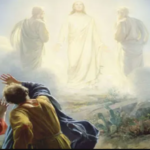Jesus Christ, God and Man
- Bu konu 1 izleyen ve 0 yanıt içeriyor.
-
YazarYazılar
-
4 Ekim 2006: 13:48 #23596EvangelistAnahtar yönetici
Summary
This article teaches that Jesus Christ is the Redeemer promised to Adam and Eve in Genesis 3:15, the only Son of God, and by that very fact, Lord of all Creation. He is the second Person of the Holy Trinity, sent to the world by the Father to become man and save us from our sins. So St. Peter said in Matthew 16:16: “You are the Christ, the son of the Living God”. The name Jesus means Savior, as we see from Matthew 1:2. The name “Christ,” “Messiah” in Hebrew, means the Anointed one (cf. Acts 10:38).
Jesus is God
“And the Word was made flesh and dwelt among us” wrote St. John (1:14). So, the Second Person of the Holy Trinity assumed human nature. Jesus Christ is the Son of God, the Divine Word of whom John wrote, “In the beginning was the Word; the Word was with God, and the Word was God” (John 1:1).
He Became Man
“In the fulness of time, God sent his Son, born of a woman” (Gal 4:4). In order to become a member of the human race in the fullest sense, the Second Person of the Trinity became man by being born of a human woman, Mary. He was conceived by her without the help of a human father, but rather, by the power of the Holy Spirit. Thus, the God-man Jesus Christ had only God as His Father, and the Virgin Mary as His Mother. (See the section on Mary, the Mother of God.)
Jesus as Teacher
We can easily see He was not the same as other great religious teachers. He not only worked miracles that could be authenticated, but worked them in contexts such that there was a tie established between the miracle and the claim, as we see in the healing of the paralytic in Mark 2. He foretold His own resurrection; He lived a life of such holiness that He could challenge people: “Which of you can convict me of sin?” (John 8:46). Hardly anyone else would dare to give such a challenge! His teaching rested not on human reasoning but on the divine authority which He claimed, e.g., when He said several times over: “You have heard it was said to them of old… but I say to you” (Matthew 5:27-44). He inspired His followers to follow Him even to dreadful deaths. If someone objects: other religions have had martyrs too – correct. But not one of them can provide the solid support of data that we can, as shown in our sketch of apologetics in part one.
Jesus as Redeemer
However, the chief reason that God became man was to redeem us from sin, that is, to pay the debt of our sins, as Leo the Great said (Letter to Flavian, June 13, 449). We read in the Epistle to the Ephesians (2:4-5): “God, being rich in mercy, because of the great love with which He loved us, even when we were dead in our transgressions, made us alive again together with Christ.” (See the section on Jesus' suffering and death.)
Jesus as Founder
He founded a Church whose doctrine can and does develop in the same line, that is, without reversing any previous teaching, over all centuries. He made clear that this was the divinely given means of getting peace in this life and eternal salvation in the world to come. (See the section on the Church.)
One Person, Two Natures
The Council of Chalcedon in 451 brought to the climax the long debates about the make-up of Jesus: He is one Person, a Divine Person, having two natures, divine and human, in such a way that these two natures remain distinct after the union in the one Person. We call this union “hypostatic union” from the Greek “hypostasis” which means person – two natures joined in one Person.
His human nature is the same as ours, for he had a human body and a human soul. He was like us in all things except that He was without sin, even though He was tempted as we are (Hebrews 4:15). However, this does not mean that He had within Him disorderly passions. The Second Council of Constantinople in 553 defined this truth against “impious Theodore of Mopsuestia”.
His divine nature is the same as that of the Father. The Council of Nicea in 325 defined that He is “one in substance [homoousios] with the Father”.
The Wonder of the Incarnation
Finally , Plato, the great Greek philosopher, in his Symposium 203, wrote: “No god associates with men”. Aristotle in his Nichomachean Ethics 8. 7 wrote that friendship of a god with a man is impossible; the distance is too great. What would they have thought had they learned that God actually became man, and even, that He willed for our sake to submit to a horrible and shameful death? In the Old Testament, Deuteronomy 21:23 says: “Cursed be everyone who hangs on the wood”. No wonder St. Paul told the Corinthians (I. 1:23) that the doctrine of the cross is folly to the Greeks, and a scandal to the Jews!
Ey bütün yorgunlar ve yükü ağır olanlar!
Bana gelin, ben size huzur veririm.
( Mat.11:28 ) -
YazarYazılar
- Bu konuyu yanıtlamak için giriş yapmış olmalısınız.

















